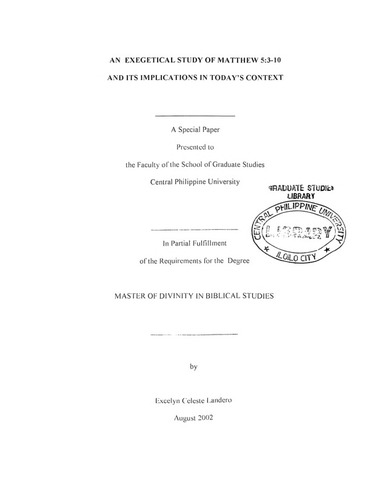Ipakita ang simpleng tala ng item
An exegetical study of Matthew 5:3-10 and its implications in today’s context
| dc.contributor.adviser | Bunda, Nestor D. | |
| dc.contributor.author | Landero, Excelyn C. | |
| dc.date.accessioned | 2021-04-08T06:25:46Z | |
| dc.date.available | 2021-04-08T06:25:46Z | |
| dc.date.issued | 2002 | |
| dc.identifier.citation | Landero, E. C. (2002). An exegetical study of Matthew 5:3-10 and its implications in today’s context (Unpublished Master's special paper). Central Philippine University, Jaro, Iloilo City. | en_US |
| dc.identifier.uri | https://hdl.handle.net/20.500.12852/742 | |
| dc.description | Abstract only | en_US |
| dc.description.abstract | This study aims to interpret and theologically reflect on the content of Matthew 5: 3-10. Specifically, this study analyzes the significant issues found in the eight Beatitudes as recorded in Matthew 5:3-10 and their implications in today’s Philippine context. This study hopes to oiler insights and lessons for Christians who are struggling to find a deeper meaning of life. The content of this study includes a brief introduction to the book of Matthew; exegesis of Matthew 5:3-10; implications of Matthew 5:3-10 in today’s Philippine context, and theological reflections. Two levels of analysis are used in this study. The first level is historical. In this level of analysis the background and historical setting of the eight Beatitudes in Matthew 5:3-10 are examined, discerning historical context from which the eight Beatitudes were addressed. The second level of analysis employed in this study is structural analysis in which the meanings of significant issues written in Matthew 5:3-10 are determined. This study takes into consideration two important perspectives as points of departure in the process of interpreting the biblical texts, namely, the view of Jesus and the view of the subjects mentioned in Matthew 5: 3-10 who are the poor, deprived and oppressed. It was found out that the Beatitudes as stated in Matthew 5: 3-10 encompass a holistic understanding of the requisite for a meaningful and abundant life. The Latin term beatus from which the English word Beatitudes was derived, approximates the Greek word µαĸάριοι which means joy, blessing, wisdom, success, and prosperity Christians who adhere to the beatitudes of Jesus certainly experience God's blessings now and will certainly experience them in the near future. Such blessings experienced by those who have entered the Kingdom of Heaven include harmony, prosperity, abundance and meaningful life in Jesus Christ. Those who felt impoverished, deprived and oppressed, regardless of their material positions, are welcomed in the Kingdom of Heaven as announced by Jesus as long as they felt the need for a right relationship with other people and with God. The implications of the beatitudes in today’s Philippine context, wherein poverty, unemployment, landlessness and corruption are widespread, include the following: 1) Christians are encouraged to live a humble and honest life, a life which is not proud but honest. 2) Christians are summoned to criticize and accept one’s own mistakes as a way of mourning, in order to forgive others and to experience God’s forgiveness. 3) Christians are called to submit meekly to God’s power, to surrender to God in order to inherit the land with its abundance and produce. 4) Christians are called to live a life of righteousness. Right living is doing what is just in thought, in word, and in deed. 5) Christians are encouraged to be merciful, showing kindness, compassion and desire to do something for the less privileged in the society. 6) Christians are encouraged to be pure in heart. Problems in the society like destruction of the environment, corruption and unemployment intensify partly because of greedy hearts. Purifying the heart would minimize if not totally eradicate evils in the society. 7) Christians are encouraged to be peacemakers. They are summoned to take an active role in creating a peaceful and better world. 8) Christians are challenged to face persecution which is the effect of doing what is just and right. Persecution will not weaken the Christian. Rather, it will make his/her Christian faith in Jesus stronger. | en_US |
| dc.format.extent | iii, 64 leaves | en_US |
| dc.language.iso | en | en_US |
| dc.rights | Attribution-NonCommercial-NoDerivs 3.0 Philippines | * |
| dc.rights.uri | http://creativecommons.org/licenses/by-nc-nd/3.0/ph/ | * |
| dc.subject.ddc | TheoLib Thesis 200.72 L233 | en_US |
| dc.subject.lcsh | Beatitudes | en_US |
| dc.subject.lcsh | Bible. Matthew | en_US |
| dc.subject.lcsh | Bible. Matthew--Commentaries | en_US |
| dc.subject.lcsh | Christian life | en_US |
| dc.title | An exegetical study of Matthew 5:3-10 and its implications in today’s context | en_US |
| dc.type | Special paper | en_US |
| dc.description.bibliographicalreferences | Includes bibliographical references | en_US |
| dc.contributor.chair | Equiña, Limuel R. | |
| dc.contributor.chair | David, Fely P. | |
| dc.contributor.department | School of Graduate Studies | en_US |
| dc.description.degree | Master of Divinity in Biblical Studies | en_US |



